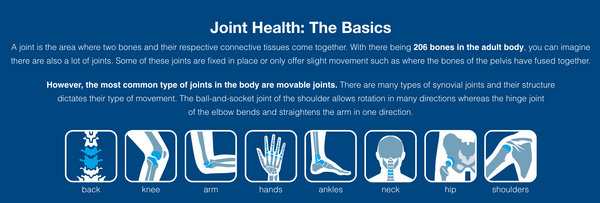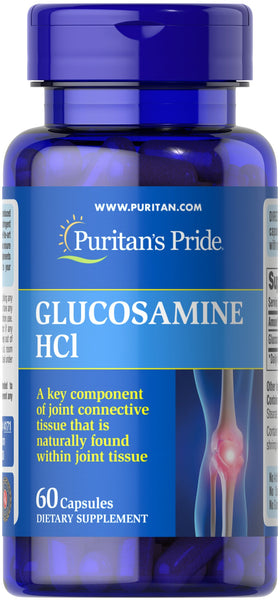Puritan's Pride Glucosamine 680 mg HCl / 60 Capsules / Item #004171 / Item #4171
Other Sizes
Puritan's Pride
Glucosamine 680 mg HCl
/ 60 Capsules / Item #004171 / Item #4171
Expiry Date: Apr 2026
- A key component of joint connective tissue that is naturally found within joint tissue
- Contains a one-month supply of capsules
Are you one of the 30 million adults with joint concerns?
Roughly 1 out of every 5 adults in the US has concerns about joint comfort. These concerns increase with age and tend to be more prevalent in women than men.1
These concerns increase with age and tend to be more prevalent in women than men.1 Additional risk factors include joint injury or overuse, occupational exposure, genetics, and obesity. Occasional joint flare-ups can also occur in otherwise healthy adults in response to exercise.
Joint health is best managed with a multi-faceted approach including joint-friendly exercise, maintaining a healthy weight, and nourishing your joints from within with specialized supplements.*

FAQ: What is glucosamine known for?
Glucosamine contributes to joint health.*It is a key structural component in cartilage and, as a dietary supplement, can be absorbed into the body. Supplementing with 1500 mg of glucosamine a day is the most recommended dosage.
FAQ: Where does glucosamine come from?
The most common source of glucosamine used in dietary supplements is shellfish. The hard exoskeletons of crustaceans such as crabs and shrimp contain a substance called chitin. Chitin is a rich source of glucosamine and acts as the starting material for many dietary supplements. Glucosamine can also be found in the cell walls of plants and fungi, making shellfish-free forms of glucosamine available.
FAQ: Who should take glucosamine?
Glucosamine is the ideal supplement for anyone looking to provide their body with compounds naturally found within the joints. This could mean anyone from competitive athletes to laid-back retirees. Those with occupations that require long periods of standing, walking long distances, or a heavy physical work load are especially good candidates as these can cause stress on joints. Joints are responsible for movements so taking care of them is important to keep moving. Staying active is an important part of a healthy lifestyle.
FAQ: Why do I need to supplement with glucosamine?
Although glucosamine is naturally produced by the body, levels of glucosamine may decline with age. There are no major food sources of glucosamine so it is challenging to get in your daily diet without the help from supplementation.
FAQ: Can glucosamine be taken long-term?
As a dietary supplement, this product is intended to be taken every day to provide a key component of joint connective tissue. Participating in low-impact exercise is an excellent way to move your joints and increase blood flow to that area. Walking, swimming and yoga are all great options with benefits for your overall health. Daily stretching is highly encouraged and a gentle stretch first thing in the morning can be a great way to start your day.
FAQ: How does chondroitin work?
Chondroitin sulfate is a naturally-occurring nutrient found in various types of connective tissue such as cartilage, bone, ligaments and tendons. The structure of chondroitin sulfate causes it to attract water which is good news for your joints.
FAQ: Is exercise bad for my joint health?
Physical activity can actually improve joint comfort as well as joint function and quality of life. Strengthening the muscles around a joint help to stabilize the joint itself, improving joint comfort. Incorporate weights, resistance bands, and calisthenics into your exercise routine at least two days a week. Flexibility training such as yoga and stretching should be performed daily to maintain range of motion. Low-impact aerobic activities such as walking, cycling, swimming and light gardening can all be joint friendly and heart healthy. Before starting an exercise program, we recommend consulting with a healthcare professional on the level and intensity of exercise appropriate for you.
FAQ: Do I only need to take glucosamine on occasion?
Glucosamine is a nutrient whose levels in the body may decline with age. As such, it should be consumed on a regular basis. Just as you would take a multivitamin every day to ensure your body is getting all the vitamins and minerals it needs, glucosamine should be taken daily to deliver nutrition to your joints.*
FAQ: If glucosamine is naturally found in the body, why do I need to take a supplement?
While it’s true that glucosamine is naturally found in the body, this does not mean that supplementation is not important. There are many nutrients produced in the body that can still be important as a dietary supplements. For example, vitamin D is produced in the body when the sun is exposed to sunlight. Despite this, taking vitamin D as a supplement can contribute to obtaining optimal levels of this important nutrient. Even if you do not choose to supplement with vitamin D, there are food sources of vitamin D available in the diet such as eggs and fortified milk. Unfortunately, there are no major dietary sources of glucosamine, making supplements even more important.
FAQ: Do I need to take glucosamine if I eat shellfish?
There are no major food sources of glucosamine. Although glucosamine can be sourced from shellfish, it comes from the hard outer shell and not the part you eat. By supplementing with Puritan’s Pride® glucosamine products, you can be sure you are getting this important nutrient.
FAQ: Can people with shellfish allergies take glucosamine?
It is true that most of the glucosamine in dietary supplements is sourced from shellfish. However, shellfish is not the only source of glucosamine available. Glucosamine can also be found in the cell walls of plants and can be extracted to make supplements. Puritan’s Pride® offers a shellfish-free glucosamine that is sourced from corn. Vegetarians and anyone else looking to avoid shellfish can still reap all the benefits of glucosamine by choosing a shellfish-free version. Anyone with a shellfish allergy is advised to carefully read product labels before purchasing.
FAQ: Is glucosamine only for runners and athletes?
Repetitive movements performed in certain sports such as running may cause wear and tear on the joints, especially if performed consistently with bad form. Glucosamine may be a particularly good choice for active individuals who are looking to provide their body with a key structural component of cartilage. But that doesn’t mean it is only intended for the elite athlete. Glucosamine is ideal for anyone since levels can decline with age. Whether it be daily walks or just running errands, staying active is important for everyone.
References:
- 1. Barbour KE, et al. Morb Mortal Wkly Rep. 2017;66:246-253
- 2. Dahmer S, Schiller RM. Am Fam Physician. 2008;78(4):471–476.
- 3. Glucosamine sulfate. Altern Med Rev. 1999;4(3):193–195.
- 4. Qiu GX, et al. Zhonghua Yi Xue Za Zhi 2005, 85:3067-3070.
- 5. Zhang WB, et al. Zhonghua Wai Ke Za Zhi. 2007;45(14):998–1001.
- Individual Results May Vary
We Also Recommend










